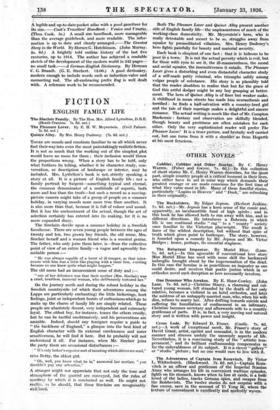FICTION
ENGLISH FAMILY LIFE
The Sinclair Family. By The Hon. Mrs. Alfred Lyttelton, D.B.E.
Quince Alley. By Mrs. Henry Dudeney.. (7s, 6d. net.) ... _f THERE are moods and emotions familiar to us all which never find their way into even the most painstakingly realistic fiction. It is not so much that the working out of the simplest plot would leave no room for them ; their inclusion would throw
the proportions wrong. When a story has to be told, only what furthers its telling, whether it be character, study, con- versation, or description of landscape or interior, may be included. Mrs. Lyttelton'S book is not, strictly speaking, a story at all. It is a picture of English family life : not a family portrait by Sargent—something typical and eternal, the common denominator of a multitude of aspects, both more and less than the truth—but such a record as a moving- pictiire camera might take of a group of people on a summer holiday, in varying moods none more true than another. It
is alio more than that, because it is full of colour and sound. But it has the enchantment of the ,actual, though the art of selection certainly has entered into its making, for. it, is no
mere expanded diary.
The Sinclairs decide upon a summer holiday in a_ Swedish
farmhouse. There are seven young people between the ages of twenty and ten, two grown boy friends, the old nurse, Mrs. Sinclair herself and a woman friend who is a musical genius. The father, who only joins them later, is—from the collective point of view of an entire family—a vague and agreeably for- midable person :-
" He was always capable of a burst of ill-temper, so that inter- course with him was a little like playing with a tame lion, exciting because no one knew quite what might happen."
The old nurse had an inconvenient sense of duty and :- " one of her delusions was that their mother (Mrs. Sinclair) was a cruel, heartless, immoral woman, who deliberately tortured her."
On the journey north and during the robust holiday in the Swedish countryside (of which their adventures among the Lapps are particularly enchanting) the little bickerings, hurt feelings, joint or independent bursts of enthusiasm which go to make up the charm of family life are simply related. These people are absolutely decent, very independent and extremely loyal. The oldest boy, for instance, teases the others cruelly, but he can be tactful unobtrusively, and his persecutions are amiable. Indeed, should any foreigner require 'a guide to
" the backbone of England," a glimpse into the best kind of English character with its external carelessness and inner sensitiveness, he will find it here. But he probably will not understand it all. For instance, when Mr. Sinclair joins the party there are occasional disturbances :-
"It's only father's superior sort of taunting which drives me mad," - cries Betty, the eldest girl.
" Oh, well, you know what he is," answered her mother, " you shouldn't pay any attention."
A stranger might not appreciate that not only the tone and
atmosphere of the quarrel are ,, conveyed,,.biit the rules of courtesy by which it is conducted as well. He might not reallic, as he should, that these Sinelairs arc recognizably
" " • •
Both The Pleasure Lover and Quince Alley present another side of. English family life—the unpleasantness of much of the working-class domesticity. Mr. Meyerstein's hero, who is really detestable and meant to be so, struggles away from squalor by premeditated villainies. Mrs. Henry Dudeney's hero fights painfully for beauty and material security.
Each book is eloquent of one fact : that it is hideous to be poor in a town. It is not the actual poverty which is evil, but for those with eyes to see it, the ill-manneredness, the moral and social squalor, the insensitiveness it entails. The Pleasure LOW gives a disturbing and even distasteful character study of a self-made petty criminal, who triumphs safely among vulgar people of substance. His story is so plausibly told that the reader shudders to realize that but for the grace of God this artful dodger might be any boy grasping at better- ment. The hero of Quince Alley is of finer but weaker make.
A cluldhood in mean streets has made neurasthenic and terrified : -he finds a half-Salvation with a country-bred girl
and the tale of their marriage makes a delightful and sincere _ - romance. The actual writing is much like that of Mr. Compton
Mackenzie : fantasy and observation are skilfully blended,' though beauty and prettiness are often mistaken for each other. Only the very sophisticated reader will prefer The Pleasure Lover. It is a truer picture, and brutally well carried out, but one turns from it with a shudder'as from Hogartb at-his -most ferocious.










































 Previous page
Previous page